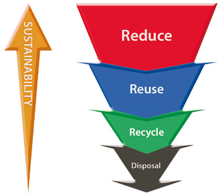

Ruth E. Callard, CPA, MBA |
Sustainability: Mending is Better than EndingIn the past couple hundred years our economy has been resource-based rather than labor-based. Part of the reason we could 'afford' this culture was because the health, pollution and other costs were born by the general public. Now it might be appropriate to switch back to a labor-based economy so I have had to rethink what it means for me to be professional in an office setting. Professionalism now includes consideration beyond my clients and myself. Being sustainable is natural for an accountant and it really can be fun. My more challenging goal is to reduce my footprint each year. Please share your tips and ideas with me and feel free to let me know what else I might try. Examples of some choices I made are below. Thank you all for your excellent cooperation in all of this! Battery Backup - When my battery backup machine quit working, just outside of warranty of course, I was determined not to buy a new one. I researched the web and it looked like the problem could be a bad battery. On the Belkin website, there were no clear instructions about how to replace the battery! However, I looked further and there was a nice set of instructions by one of those web people who love to share information. I found a store in south Seattle, Allied Battery, that sold the battery and recycled the old one. It now works and I saved a trip to the dump. Shredder - When I was sharing office space, there was a shredder that didn't work very well, partly because people put more than three pages through at a time. I started reading about shredders and I began to take it apart. The Zen thing didn't work for me and so I searched for hours trying to find a solid hand crank shredder that would last forever; I only found very cheap ones made overseas. I knew Larry Michelson, a person who fixes old copiers, and I called him. Larry suggested that I squirt oil back and forth on a piece of paper and run it through the shredder. After the oiling it ran much better and didn't make such a terrible noise.  Paper and toner - I now can find 100% recycled mailing envelopes at Keeneys.com in Redmond and Complete-office.com in Seattle. I also switched to 20lb 100% recycled (versus 25lb bond) for paper and small envelopes. I fold the letters so the content is on the inside to ensure that any confidential information is obscured. I use two toner cartridges and way less than one box of paper for my business in a year. All toner cartridges are recycled. I subscribe only to electronic, online tax research products. Incentives - My tax prep time is less for clients who submit and receive files electronically. Website - Bus lines are clearly indicated on my directions page and I have a link for instructions and tips on going paperless. Recycling - I use the paper cutter and chop off any personal information to make small note pads out of the rest of the sheet. Paper with non-personal information is recycled. I recycle dvds into coasters by adding circles of wool felt. Office and equipment - The new office uses mostly natural light and has windows that have a U-factor of .30 and Solar Heat Gain Coefficient of .20. The light bulbs is use are compact fluorescent. The office is within 1/4 mile of many buses and I have an indoor bike stand for clients. The thermostat in the house is set at 68° and I always wear a sweater. My computer and monitors are set to save energy when not in use; a great feature when one has an office in home. I drink only tap water. (Now wouldn't we be in a world of hurt if we couldn't drink the City water!) Carbon offsets - I buy carbon offsets and retire them, through the Bonneville Environmental Foundation, to offset my business and personal direct energy use. Below is an article that I wrote for the ASWA professional newsletter. It outlines my efforts to green a 2007 continuing education conference that I co-organized.
|
© 2020 Ruth E. Callard C.P.A. All rights reserved. The text, images, graphics and their arrangement are all subject to copyright and other intellectual property protection.
The information in this website should not be construed as professional advice. You should not take action without further analysis or explanation of the subject matter as it applies to your own situation.